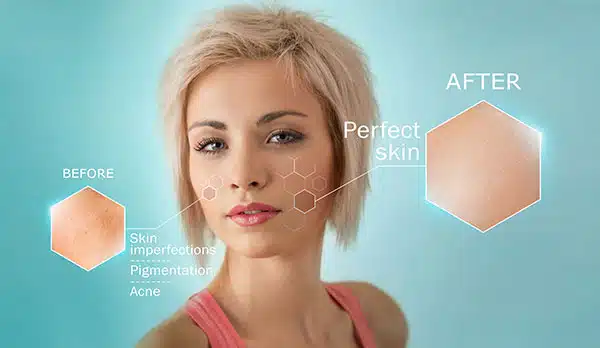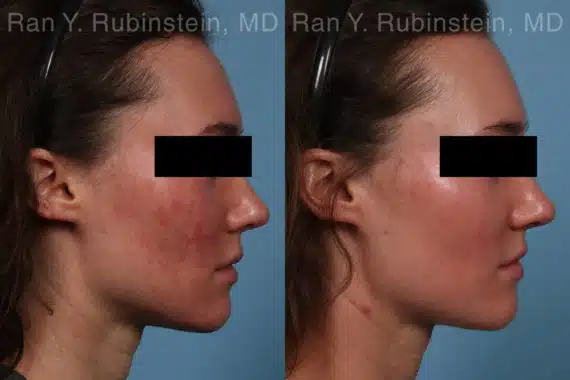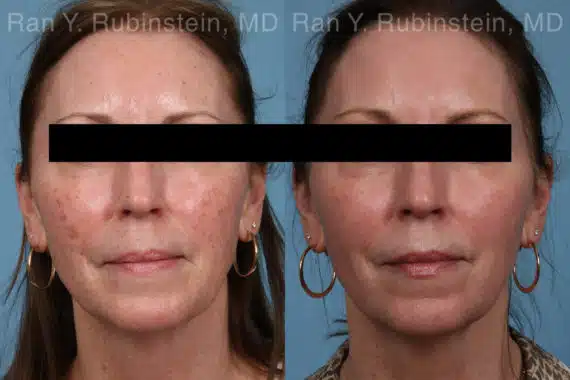Yes, when performed by an experienced professional and on the right candidate, laser skin resurfacing is generally safe. But if you’re still curious but cautious, you’re not alone: understanding how the treatment works, who it’s best for, and what can happen helps you decide with confidence. Like any cosmetic procedure, resurfacing carries risks. Side effects are typically milder and less likely with non-ablative lasers than with deeper, ablative approaches, but issues can still occur.
The good news: choosing a skilled, board-certified provider like Dr. Rubinstein, prepping properly, and following aftercare (especially sun protection) go a long way toward a smooth, safe outcome. Below, we break down safety, candidacy, pros and cons, and what to expect long-term.

How Safe Is Laser Skin Resurfacing for Different Skin Types?
Laser skin resurfacing can be safe across all skin types (Fitzpatrick I-VI) when the plan is tailored by an experienced specialist. For types I-III, fractional ablative or hybrid approaches often deliver faster change with manageable downtime. For types IV-VI, the risk of post-inflammatory hyperpigmentation is higher, so clinicians favor non-ablative fractional wavelengths such as 1440–1550 nm or 1927 nm, conservative energy and density, larger spot sizes, and small test spots first. Pre-treating melasma when present, avoiding tanning, and strict sun protection before and after treatment further reduce risk. With the right device and settings, most skin tones can achieve safe, natural-looking results.
What Are the Pros of Laser Resurfacing?
Laser skin resurfacing benefits include:
- Improved skin texture by reducing fine lines and wrinkles.
- Reduced acne scars and hyperpigmentation, creating an even skin tone.
- Enhanced collagen production, resulting in firmer, smoother skin.
- Minimally invasive, typically performed as an outpatient procedure.
- Rapid results, with visible improvements often appearing within weeks.
- Precision targeting allows treatment of specific areas without affecting surrounding skin.
What Are the Cons of Laser Resurfacing?
Laser skin resurfacing’s potential drawbacks may include:
- Potential side effects, including redness, swelling, and temporary sensitivity.
- Risk of pigmentation changes, particularly in people with darker skin tones.
- Downtime, which can range from a few days to several weeks depending on intensity.
- Possible discomfort or mild pain during and immediately following treatment.
- Multiple treatments may be required for optimal results, increasing costs and recovery time.
- Sun sensitivity post-treatment requires diligent sun protection to prevent complications.
Who Shouldn’t Get Laser Resurfacing Treatments?
While laser resurfacing is a great option for many people, it’s not suitable for everyone. Certain medical conditions, skin types, and external factors can increase the risk of complications or limit the effectiveness of the treatment. If you fall into any of the following categories, you may need to consider alternative treatments or consult with a qualified professional to determine the best course of action.
1. You Have a Dark Complexion
Having a darker skin tone does not automatically rule you out as a candidate for laser resurfacing, but it does come with additional considerations. Darker skin is more prone to post-inflammatory hyperpigmentation (dark spots) or hypopigmentation (light spots) after treatment. These changes can sometimes be long-lasting. If you have concerns about pigmentation changes, it’s crucial to seek out a provider with experience in treating a variety of skin tones. An expert will know how to select the safest laser type and settings for your skin.
2. You Have a Cold Sore
If you have the herpes simplex virus, laser resurfacing can trigger a flare-up, leading to painful cold sores after treatment. To reduce this risk, your provider will likely prescribe an antiviral medication before your procedure. Taking this precaution helps minimize outbreaks and ensures a smoother healing process. If you have a history of frequent cold sores, be sure to inform your doctor so they can tailor your treatment plan accordingly.
3. You Are Prone to Keloid Scars
If your skin tends to form keloid scars—raised, thickened scars that extend beyond the original wound—laser resurfacing may not be the best option for you. The laser creates controlled damage to the skin to stimulate healing, but in individuals prone to keloids, this can result in excessive scarring instead. Since keloids can be difficult to treat once they form, it’s crucial to discuss your medical history with your provider. They may recommend alternative treatments that minimize your risk.
4. You’re Pregnant or Breastfeeding
If you’re pregnant or breastfeeding, it’s generally recommended to avoid laser resurfacing treatments. While there is no concrete evidence that laser treatments directly harm the baby, hormonal changes can affect how your skin heals and increase sensitivity, leading to unexpected reactions or pigmentation issues. Additionally, many post-treatment skincare products contain ingredients that may not be safe during pregnancy. If you’re considering laser resurfacing, it’s best to wait until after pregnancy and breastfeeding to ensure optimal results and safety.
5. You’re Having an Acne Breakout
If you have an active acne breakout, it may be best to delay laser resurfacing. Some lasers are designed to treat acne, but undergoing treatment while experiencing severe breakouts can increase the risk of infection. Additionally, acne can interfere with the laser’s effectiveness, making results less predictable. Certain acne medications, can also make the skin more sensitive and slow down healing. If you’re treating acne, consult your provider about safer alternatives or the best timing for laser resurfacing.
6. You Have Taken Isotretinoin Recently
If you have taken isotretinoin (commonly known as Accutane) within the past year, laser resurfacing is not recommended. This powerful acne medication affects the skin’s ability to heal and increases the risk of scarring or excessive irritation after laser treatments. Because isotretinoin makes the skin more fragile and slows down recovery, most providers will recommend waiting at least six to twelve months before considering laser procedures. If you’ve recently used isotretinoin, consult your doctor for safer alternatives to achieve your skincare goals.
7. An Autoimmune Disease or a Weak Immune System
If you have an autoimmune disease or a weakened immune system, laser resurfacing may not be the best option for you. Since the procedure works by creating controlled damage to stimulate healing, individuals with compromised immune systems may struggle with prolonged recovery times and an increased risk of infection. Conditions like lupus, rheumatoid arthritis, or immunosuppressive treatments can affect how well your skin heals. It’s crucial to consult with your doctor to determine if laser resurfacing is safe or if an alternative treatment would be better suited for your skin.
8. You’ve Had Another Laser Treatment Before
If you’ve recently undergone another laser treatment or radiation therapy to the face, your skin may not be ready for another resurfacing session. Lasers work by creating controlled damage to stimulate healing, but subjecting your skin to too many treatments in a short period can lead to excessive irritation, prolonged recovery, or even complications like scarring. Before considering another laser procedure, consult with a specialist to determine whether your skin has had enough time to heal and if alternative treatments might be a safer option.
Start Your Journey to Success, Don’t Wait More!
Join our satisfied clients who’ve experienced safe, effective treatments.
What Are the Long-term Side Effects of Laser Treatment on the Face?
While true long-term complications are uncommon—especially with conservative settings and expert technique—some effects can persist or appear months after treatment. Risk varies by laser type (ablative vs. non-ablative), treatment depth, skin type, and how closely aftercare and sun protection are followed.
- Ectropion (very rare): Outward turning of the lower eyelid, typically associated with aggressive ablative resurfacing around the eyes—more likely in people with preexisting eyelid laxity. Requires prompt medical evaluation and may need surgical correction.
- Changes in skin color (hyperpigmentation or hypopigmentation): Areas may heal darker or lighter than the surrounding skin. This is more likely in darker skin tones, after aggressive/ablative treatments, or with inadequate sun protection. Many cases fade over time, but some can be long-lasting.
- Scarring: Rare but possible (hypertrophic or atrophic). Risk increases with deeper passes, infection, picking at healing skin, or smoking. Early recognition and treatment can improve outcomes.
- Texture changes: Persistent roughness, enlarged pores, or a “mottled” surface can occur, especially after deeper resurfacing. Long-lasting dryness or tiny white bumps (milia) may also appear; these often improve gradually with proper skincare.
- Infections (rare): Bacterial, viral (e.g., cold sore/HSV reactivation), or fungal infections can complicate healing and increase scarring risk. Preventive measures and prompt treatment reduce the chance of long-term effects.
So, Is Laser Skin Resurfacing Worth It?
Yes, assuming you qualify for the treatment, laser resurfacing is one of the best ways to achieve facial rejuvenation and correct aesthetic concerns without the extended recovery time associated with plastic surgery. It can effectively reduce fine lines, wrinkles, acne scars, and sun damage while improving overall skin texture and tone.
This procedure is a great investment for those seeking long-term improvements in their skin’s appearance. With a variety of laser options available, an experienced provider can tailor the treatment to your specific needs, ensuring optimal results with minimal risk. If you want to refresh your skin without undergoing invasive surgery, laser skin resurfacing is a highly effective and worthwhile choice.
Patient Results
* All patients are unique and individual results may vary.
Who Should Perform My Laser Resurfacing Treatment?
While laser skin resurfacing is a safe and effective procedure for many patients, choosing an experienced and skilled provider is key to minimizing risks and achieving the best results. A board-certified facial plastic surgeon or dermatologist with expertise in laser treatments can assess your skin type, medical history, and goals to determine if laser resurfacing is right for you.
Dr. Ran Y. Rubinstein, a double-board-certified facial plastic surgeon, is an expert in laser skin resurfacing and non-surgical skin rejuvenation. With his extensive experience, he can recommend the safest and most effective treatment for your unique needs. Whether you’re a candidate for laser resurfacing or a better alternative, Dr. Rubinstein will guide you through the process. Call us today at (845) 863-1772 to schedule a consultation and find the best solution for your skin concerns.


